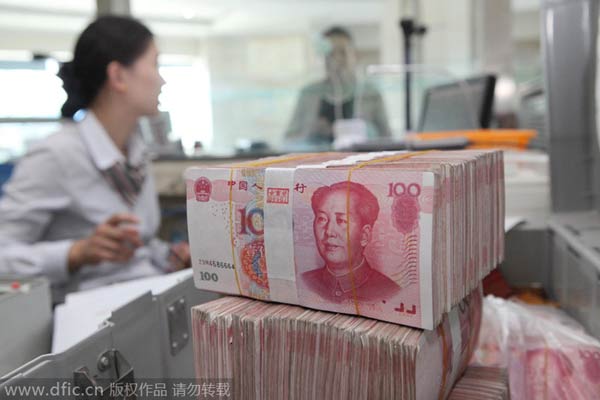PBOC confirms debt-swap plan
Updated: 2015-05-15 14:29
By Zheng Yangpeng(chinadaily.com.cn)
|
||||||||
 |
|
An employee counts renminbi (yuan) banknotes at a bank in Lianyungang city, East China's Jiangsu province, June 4, 2014.[Photo/IC] |
The People' Bank of China on Friday confirmed a plan asking banks to directly replace local governments' legacy debt with the bonds they issued.
It also said the plan is to ensure that large extra liquidity is not unleashed in the market.
Earlier reports said the Ministry of Finance, the PBOC (the central bank) and the China Banking Regulatory Commission jointly issued a landmark document, which establishes detailed measures for promoting bond issues by local governments. At the center of the plan is a requirement that banks have to accept a minimum amount of bond placements, as defined by their pro rata share of an issuing local government's total debt to be swapped.
Pan Gongsheng, deputy governor of PBOC, confirmed the existence of the document on Friday's press briefing.
The Ministry of Finance in March announced a 1 trillion yuan debt-for-bonds swap plan that would cut local governments' interest payments and extend the maturity of their debt. But that plan hit a snag on April 23 when Jiangsu province had to delay a bond issue after failing to agree on terms with banks.
The debt included in the latest "private placement" plan is estimated to be 56.6 percent of local government's debt stock until June 2013. The plan is hailed by financial industry as it avoided the massive bond supply in the open bond market that would otherwise soak up the liquidity and drive up the interest rate.
Up to 900 billion yuan of bonds will be absorbed via "private placement" with banks, while another 800 billion yuan of bonds will be sold in the open bond market, according to analysts at Haitong Securities Co Ltd and Minsheng Securities Co Ltd.
"The direct swap plan only involved adjustment on banks' accounts: from loans to bonds. Thus it would not inject massive liquidity into the financial market," Pan said.
"As we know, banks have a high acceptance of the local government bonds. The plan is good for banks to improve their asset portfolio, avoid occupancy of capitals, and possibly improve the liquidity of their assets," Pan said.
As part of the document, the PBOC accepted the bonds banks purchased as eligible collateral to the central bank for repo and other liquidity operation purposes. Thus the liquidity of this asset is improved.
"The inclusion of the bonds as collateral for repo and other liquidity operation does not necessarily means the central bank will conduct these operations, thus liquidity will not be significantly boosted. It should not be regarded as quantitative easing," Pan said.
He also said he is confident that all the 1 trillion yuan bonds will be sold before August 31, as the document stipulated.

 Cannes Film Festival unrolls star-studded red carpet
Cannes Film Festival unrolls star-studded red carpet
 Amazing artworks in supermarkets
Amazing artworks in supermarkets
 Top 10 venture investors in the world
Top 10 venture investors in the world
 Ten photos you don't wanna miss - May 14
Ten photos you don't wanna miss - May 14
 Classical private school in Qinling Mountain
Classical private school in Qinling Mountain
 Heads of state show you around Xi'an
Heads of state show you around Xi'an
 Cross dressing for Peking Opera
Cross dressing for Peking Opera
 Ten photos you don't wanna miss - May 13
Ten photos you don't wanna miss - May 13
Most Viewed
Editor's Picks

|

|

|

|

|

|
Today's Top News
Premier Li says talks with Modi 'meet expectations'
PBOC confirms debt-swap plan
US and Cuba to hold another round of talks
US would consider military force to defend Gulf nations: Obama
Xi to give Modi a hometown welcome
Aviation, railway top Li's agenda for Latin America
Cui rebuffs US stance on
S. China Sea
China set to delay maiden flight of C919 commercial jet
US Weekly

|

|






